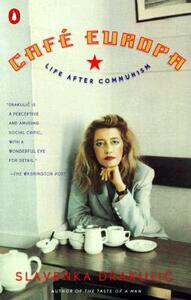Take a photo of a barcode or cover
Kind of feeling like starting to write down my thoughts again from time to time. So hi, I’m back throwing mini reviews out there, mostly because I enjoy going back and revisiting my reactions and sentiments. Maybe you’re interested in hearing me talk, too :)
I came across Drakulić by chance and didn’t expect all that much, but the subject matter intrigued me immensely (the history of Eastern Europe is so underrepresented in “Western” textbooks, it’s ridiculous). I found the essays to be original, personal and thought-provoking, covering different aspects of daily life, internalized emotions and collective behaviour rooted in growing up in a communist country. It made for a quick read to pick up during coffee break or breakfast, most of the chapters being around 10 pages long. I’ll certainly read more of her work!
Bear in mind, though, that this was first published in 1996, not that long after the fall of communism and amidst the Yugoslaw wars. I’d love to hear Drakulić’s take on the current state of Europe!
I came across Drakulić by chance and didn’t expect all that much, but the subject matter intrigued me immensely (the history of Eastern Europe is so underrepresented in “Western” textbooks, it’s ridiculous). I found the essays to be original, personal and thought-provoking, covering different aspects of daily life, internalized emotions and collective behaviour rooted in growing up in a communist country. It made for a quick read to pick up during coffee break or breakfast, most of the chapters being around 10 pages long. I’ll certainly read more of her work!
Bear in mind, though, that this was first published in 1996, not that long after the fall of communism and amidst the Yugoslaw wars. I’d love to hear Drakulić’s take on the current state of Europe!
informative
A selection of essays and musings about life in the Balkans adjusting to post-communist society. I didn't really like how the writer sometimes looks down on the poverty in the former Soviet bloc whilst raving about the western convenience she now has the privilege to access. Still plenty of unique insight on Balkan and Eastern European life and perspectives and this was a much welcome easy read.
I just finished rereading this book, and now that I live in a former Communist country (Hungary) I can't help noticing so many of the phenomena Drakulic mentions, even 11 years after she wrote this. Cafe Europe provides great insight to the aftereffects of living in a communist society and the continuing challenges of making the painful transition.
An interesting set of essays concerning the physiological impact and effects that communism had on the population of Eastern Europe, or in the case of the examples used by the author: the Balkan region. Whether or not this can apply to this entire 'region' was not discussed in detail as the author stresses that aside from the communist regimes they were under the countries of Eastern Europe had little in common with each other.
It should be noted that all of this was written not long after the fall of the USSR, and I'm curious to see whether or not the effects and impacts discussed are still present in the discussed societies today, or whether or not the divides between the east and west are as present as they were before. I'd love to see the author's take on the 'region' as it is now, and comment on what has changed and what has not.
It should be noted that all of this was written not long after the fall of the USSR, and I'm curious to see whether or not the effects and impacts discussed are still present in the discussed societies today, or whether or not the divides between the east and west are as present as they were before. I'd love to see the author's take on the 'region' as it is now, and comment on what has changed and what has not.
الكتاب ككل يصف عقلية ما بعد الشيويعية في شرق اوروبا و التغيير الذي لم يحدث في عقلية الشرق اوروبيين و كيف أن التغيير الحادث بعد انفراط عقد الاتحاد السوفيتي هو الترنح القوي للدول الفقيرة التي كانت به
يمكن حاسه بعض الوصف في الكتاب ده بينطبق بشكل كبير أوي على المجتمع المصري و حالته بعد مروره بالملكية و الجمهورية و يمكن العقلية اللي كان و مازال يتم التفكير بها
في رأي ترتيب المقالات كان سيء إلى حد ما يمكن لو كان الترتيب مختلف و منظم عن كده كان ساعد في الكتاب شويه
كمان آخد عليها نقطة ضعف النقل ما بين الجمل في بعض المقالات لأن النقل ما بينها كان ضعيف الترابط جدًا لدرجة انه ف بعض الاحيان تحس اللي قبل ملوش علاقة باللي بعد !
يمكن حاسه بعض الوصف في الكتاب ده بينطبق بشكل كبير أوي على المجتمع المصري و حالته بعد مروره بالملكية و الجمهورية و يمكن العقلية اللي كان و مازال يتم التفكير بها
في رأي ترتيب المقالات كان سيء إلى حد ما يمكن لو كان الترتيب مختلف و منظم عن كده كان ساعد في الكتاب شويه
كمان آخد عليها نقطة ضعف النقل ما بين الجمل في بعض المقالات لأن النقل ما بينها كان ضعيف الترابط جدًا لدرجة انه ف بعض الاحيان تحس اللي قبل ملوش علاقة باللي بعد !
I read two of Drakulic's books of essays in college, and really enjoyed them. This collection is set right after Communism fell, and is not as captivating as I remember her other collections being. However, the last essay of the book is fantastic.
Влітку 2019 року я прочитала "Як ми пережили комунізм і навіть сміялися" - і захопилася Славенкою Дракуліч. Вона все так влучно говорила, так тонко відчувала, мені були настільки близькі її підхід і думки, що я відчула в ній "споріднену душу" і навіть трохи ідеалізувала. Усі наступні книжки пані Дракуліч, що виходили в українському перекладі, я купувала без вагань.
Нота бене: перш ніж я почну розповідати про вміст книжки, поділюся тим, що мені не пощастило отримати примірник з видавничим браком, не вистачає 15 сторінок посередині. Магазин, що продав книгу, був готовий піти на обмін, але, бігме, це був заскладний шлях. "Надішліть заяву на повернення і товарний чек, а якщо немає товарного чеку, то надішліть заяву на відновлення товарного чеку зі своїми паспортними даними...". Коротше кажучи, я опустила лапки і прочитала ці 15 сторінок в примірнику однієї прекрасної жінки, якій я сильно вдячна. Якщо купували, перевірте свої видання: сторінки 73-88 відсутні.
"Кафе "Європа"" була написана ще за царя Панька, між 1992-1996 роками. Югославія саме роз'єдналася, але у новоутворених країнах ще відчувається той "постсовковий" вайб, що у нас досі присутній. У цій збірці Славенка аналізує життя Східної Європи (що у її світі закінчується на Варшаві) через призму власних вражень. Здавалося б, те саме вона робила і в книжці про комунізм, але там письменниця зачіпає більше жіночі та буденні досвіди, а тут торкається в тому числі і питань національних. І я, зі своїм ідеалізованим образом славенки-що-думає-як-я, болісно сприйняла ті моменти, що у нас все таки дуже різний досвід, а, значить, різні погляди.
Есеїв у книжці багато, вони розказують як про рожевий унітаз у ванній кімнаті дочки Чаушеску, куди може тепер попісяти будь-хто за певну суму грошей, так і про усвідомлення Славенкою загальнонаціонального почуття провини за Голокост; як моральної необхідності привезти гостинці з тієї "справжньої" Європи, так і того, що Європи, яка може втрутитися і вирішити проблеми, не існує, її вигадали і сконструювали.
Особисто для мене став відкриттям комуністичний спадок Албанії, в якій за комунізму понабудовували силу-силенну бункерів по всій країні (від шестисот тисяч до мільйона!). Я гуглила сучасні фотографії, де ці бетонні "гриби" видніються на пляжах, у горах, у житлових кварталах. Гляньте і ви.
Як і казала, коли мова дійшла до питань національних, то я почувалася певною мірою зрадженою і з цим довелося якось впоратися. Якщо будете читати, то мене, наприклад, стриггерили розділи про уніформу, про Істрійський півострів, а також Славенкині спроби виправдати (?) Тіто, президента Югославії, кажучи, мовляв так, він був диктатором і шахраєм, залишив країну з величезними боргами і створював примусові трудові табори, але ж він був не таким жахливим як Сталін. Взагалі, як мені здається, Славенка, принаймні у ті часи, не підозрювала, що за східним кордоном Польщі є щось крім дикого степу, монгольських юрт і Кремля.
Це неоднозначна книжка, хоча, звісно, цікава. Багато есеїв цілком актуальні для нас і нині, не дивлячись на ті тридцять років, що минули. Про "Кафе "Європа"" можна дискутувати, головне, будьте обережні, не повторіть моїх помилок і критично ставтеся до слів авторки.
Нота бене: перш ніж я почну розповідати про вміст книжки, поділюся тим, що мені не пощастило отримати примірник з видавничим браком, не вистачає 15 сторінок посередині. Магазин, що продав книгу, був готовий піти на обмін, але, бігме, це був заскладний шлях. "Надішліть заяву на повернення і товарний чек, а якщо немає товарного чеку, то надішліть заяву на відновлення товарного чеку зі своїми паспортними даними...". Коротше кажучи, я опустила лапки і прочитала ці 15 сторінок в примірнику однієї прекрасної жінки, якій я сильно вдячна. Якщо купували, перевірте свої видання: сторінки 73-88 відсутні.
"Кафе "Європа"" була написана ще за царя Панька, між 1992-1996 роками. Югославія саме роз'єдналася, але у новоутворених країнах ще відчувається той "постсовковий" вайб, що у нас досі присутній. У цій збірці Славенка аналізує життя Східної Європи (що у її світі закінчується на Варшаві) через призму власних вражень. Здавалося б, те саме вона робила і в книжці про комунізм, але там письменниця зачіпає більше жіночі та буденні досвіди, а тут торкається в тому числі і питань національних. І я, зі своїм ідеалізованим образом славенки-що-думає-як-я, болісно сприйняла ті моменти, що у нас все таки дуже різний досвід, а, значить, різні погляди.
Есеїв у книжці багато, вони розказують як про рожевий унітаз у ванній кімнаті дочки Чаушеску, куди може тепер попісяти будь-хто за певну суму грошей, так і про усвідомлення Славенкою загальнонаціонального почуття провини за Голокост; як моральної необхідності привезти гостинці з тієї "справжньої" Європи, так і того, що Європи, яка може втрутитися і вирішити проблеми, не існує, її вигадали і сконструювали.
Особисто для мене став відкриттям комуністичний спадок Албанії, в якій за комунізму понабудовували силу-силенну бункерів по всій країні (від шестисот тисяч до мільйона!). Я гуглила сучасні фотографії, де ці бетонні "гриби" видніються на пляжах, у горах, у житлових кварталах. Гляньте і ви.
Як і казала, коли мова дійшла до питань національних, то я почувалася певною мірою зрадженою і з цим довелося якось впоратися. Якщо будете читати, то мене, наприклад, стриггерили розділи про уніформу, про Істрійський півострів, а також Славенкині спроби виправдати (?) Тіто, президента Югославії, кажучи, мовляв так, він був диктатором і шахраєм, залишив країну з величезними боргами і створював примусові трудові табори, але ж він був не таким жахливим як Сталін. Взагалі, як мені здається, Славенка, принаймні у ті часи, не підозрювала, що за східним кордоном Польщі є щось крім дикого степу, монгольських юрт і Кремля.
Це неоднозначна книжка, хоча, звісно, цікава. Багато есеїв цілком актуальні для нас і нині, не дивлячись на ті тридцять років, що минули. Про "Кафе "Європа"" можна дискутувати, головне, будьте обережні, не повторіть моїх помилок і критично ставтеся до слів авторки.
dark
emotional
informative
reflective
sad
fast-paced
An interesting little book about Eastern Europe and the Balkans in the post-communist era. Enjoyed the insights into daily life - the book opened up a number of questions that I’d like to explore further. Recommend for a general overview of social history with a nice dose of the political.





